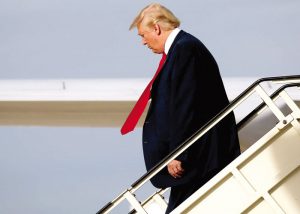Why Trump has fans in the Middle East
 As election day in the United States fast approaches, it is worth remembering why Republican Party presidential candidate Donald Trump enjoys the support of a mixed bag of foreign leaders, not least in the Middle East and North Africa (MENA) region.
As election day in the United States fast approaches, it is worth remembering why Republican Party presidential candidate Donald Trump enjoys the support of a mixed bag of foreign leaders, not least in the Middle East and North Africa (MENA) region.
Mostly, they could be put in the “basket of deplorables” category, which Democratic Party candidate Hillary Clinton used to describe her rival’s supporters in America.
There is Egyptian President Abdel Fattah al-Sisi, Israeli Prime Minister Binyamin Netanyahu and Turkish President Recep Tayyip Erdogan. The first is a strongman, the second a self-righteous revisionist, the third an authoritarian with neo-Ottoman delusions of grandeur.
Each has his problems, at home and abroad, and a shaky commitment to human rights. Each probably hopes that a President Donald Trump would not presume to lecture, harangue or take the moral high ground.
The expectation would be well-founded. In September, Trump lavished praise on Sisi, whom he met on the sidelines of the UN General Assembly. He is a “fantastic guy”, Trump said of the former chief of Egypt’s armed forces who led the military takeover three years ago. “He took control of Egypt and he really took control of it,” Trump said admiringly of Sisi’s handling of the bloody transition from Muhammad Morsi’s Muslim Brotherhood government.
Trump went on to say there was “good chemistry” between them. Unlike Clinton, who also met with Sisi in a standard game of diplomatic balancing, Trump did not raise concerns about the prosecution of Egyptian human rights organisations and activists.
Trump has also found much to admire in Erdogan. Asked if the Turkish president was exploiting July’s failed coup to purge his political enemies, Trump cautioned against American sermonising.
“When the world sees how bad the United States is and we start talking about civil liberties, I don’t think we are a very good messenger,” he said. Instead, he commended the Turkish leader, saying: “I do give great credit to Erdogan for turning it around.”
The Wall Street Journal reported Erdogan’s appreciation of Trump’s approval of the campaign his administration has pursued since the coup — dismissing academics, teachers, health workers, prison guards and forensics experts by the tens of thousands and closing media outlets.
A similar, but slightly less lyrical love-fest has been under way between Trump and Netanyahu. When they met, Trump promised his administration would recognise Jerusalem as the “undivided capital” of Israel, a simply astonishing foreign policy shift that ignored a basic fact. The United States, like almost every other country, does not recognise Jerusalem as Israel’s capital because its status is yet to be resolved.
Trump also nodded along when Netanyahu declared that peace could only be achieved if “the Palestinians renounce hatred and violence”. And Trump praised Israel’s 14-year-old, 700km “separation barrier” with the West Bank, drawing parallels with the wall he plans to build along the US-Mexican border.
Though the wily Netanyahu — this is his fourth term in office; he has been in the political game a long time — has not trumpeted the bizarre matchup of instincts and vision with Trump. It is unlikely he does not appreciate the love.
There are signs that right-wing media outlets close to Netanyahu’s Likud Party are inclining towards Trump. For Tel Aviv, a Trump administration would probably be much less trouble when it comes to expanding settlements and holding firm against a two-state solution.
There are two interlinked strands that make Trump the better presidential candidate for some foreign leaders. First, his scorn for the flawed way in which the United States practises liberal democracy. Second, his world view. Americans recognise the Republican nominee’s mindset as Jacksonian isolationism, which is to say the nativist, protectionist and isolationist ideas put forward by Andrew Jackson, seventh president of the United States. Foreign affairs specialist Walter Russell Mead described Jacksonian thinking in his book Special Providence as deeply suspicious of the world and desirous of either abandoning it or dominating it.
A retreating America would probably suit Sisi, Erdogan and Netanyahu just fine. At least there would be fewer homilies on the virtues of democracy, free speech, a vibrant media and rule of law.
That said, there is a flip side to supporting an isolationist demagogue for US president. Isolationism means a pronounced jitteriness about physical security and that requires more military dominance, not less. How else to read Trump’s promise that he “will make our military so big, powerful and strong that no one will mess with us”? How else to read his threats to whip countries around the world into submission on diverse issues such as currency manipulation, outsourcing and overseas manufacturing?
Trump’s America would go from globo-cop to globo-bully. A bully respects no laws — or rights — except his own. There may come a time even a foreign strongman might find that inconvenient.

